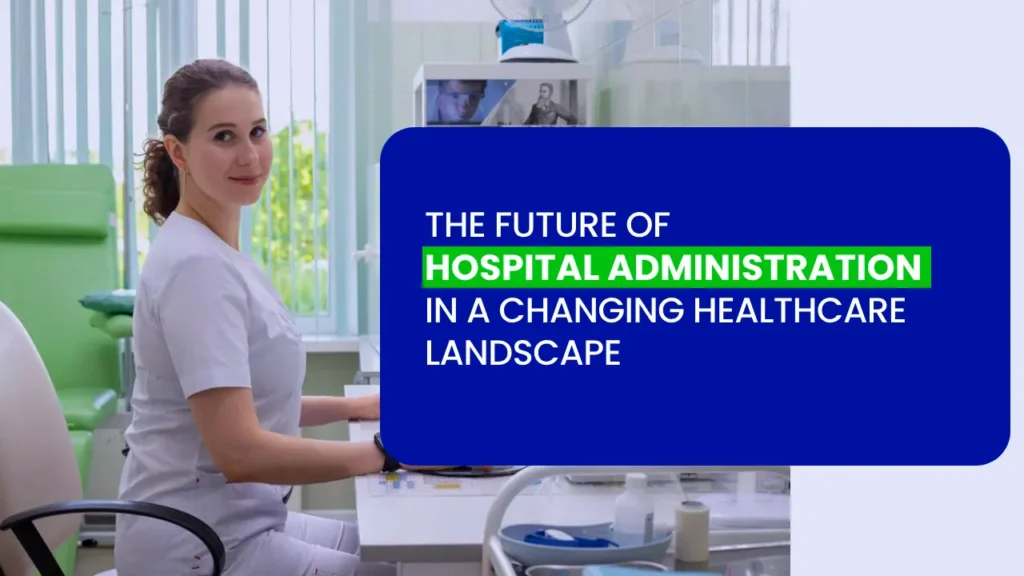Home » The Future of Hospital Administration in a Changing Healthcare Landscape
The Future of Hospital Administration in a Changing Healthcare Landscape
- BLOGGED BY SIRAS KHAN P (Content Writer) -
- Jul 22 2024 -
- 06 MINS READ

Table of Contents
The Future of Hospital Administration in a Changing Healthcare Landscape
The hospital landscape, once a beacon of stability, is undergoing a period of unprecedented transformation. Technological advancements, shifting demographics, and changing healthcare models are challenging traditional hospital administration approaches.
As we witness this dynamic environment, hospital administrators must adapt and adopt new strategies to ensure the continued success of their institutions.
Key Trends Shaping the Changing Landscape of Hospital Administration
Several key factors are driving the transformation of the healthcare industry and, consequently, the role of hospital administration:
Technological Advancements
The rise of telehealth, artificial intelligence (AI), and big data analytics is revolutionising healthcare delivery. Telehealth allows for remote consultations, improving patient access to care.
AI can automate tasks, streamline workflows, and assist with diagnosis and treatment planning.
Big data analytics empowers administrators with insights for informed decision-making on resource allocation, patient outcomes, and population health management.
Key Statistics
- According to a 2023 study by the American College of Healthcare Executives (ACHE), 73% of healthcare leaders believe that technology will be the most significant driver of change in the next five years.
- The global telehealth market is expected to grow at a compound annual growth rate (CAGR) of 25.2% from 2021 to 2028.
Value-Based Care
The healthcare landscape is shifting from a fee-for-service model to a value-based care model. This approach rewards hospitals for delivering high-quality, efficient care and reducing costs.
Hospital administrators must focus on improving patient outcomes, managing costs effectively, and demonstrating value to payers.
Key Strategies
- Implement patient care coordination programs to reduce hospital re-admissions.
- Invest in preventive care initiatives to address health issues before they become severe.
Shifting Demographics
The ageing population presents unique challenges for hospitals. Administrators need to adapt services to cater to the specific needs of this growing demographic, such as geriatric care and chronic disease management.
Key Statistics
- By 2050, the global population aged 65 and older is projected to reach 1.5 billion.
- Chronic diseases account for 71% of all deaths globally, according to the World Health Organisation (WHO).
Consolidation and Competition
The healthcare industry is experiencing consolidation, with larger hospital systems acquiring smaller facilities to gain market share. This trend increases competition, requiring hospital administrators to be competent in strategic planning and cost-containment measures.
Key Strategies
- Develop strategic partnerships with other healthcare providers to expand their service offerings.
- Focus on cost efficiency without compromising the quality of care.
Patient Experience
Patient satisfaction is becoming a crucial factor in hospital success. Hospitals are prioritising patient-centred care, focusing on factors like appointment scheduling, communication, and the overall patient experience.
Key Statistics
- According to many major health care observers, patient satisfaction scores are strongly correlated with hospital financial performance.
- Hospitals with higher patient satisfaction scores tend to have better clinical outcomes.
Develop Workforce Strategies
Address the growing healthcare workforce shortage by implementing competitive compensation and benefits packages, investing in staff training and development programs, and fostering a positive work environment.
Key Practices
- Offer professional development opportunities to retain talent.
- Promote work-life balance to reduce burnout among staff.
Embrace Collaboration
Forge partnerships with other healthcare providers, such as physicians’ groups and long-term care facilities, to deliver coordinated care and optimise patient outcomes.
Key Strategies
- Develop integrated care pathways to streamline patient transitions between different care settings.
- Collaborate with community organisations to address social determinants of health.
Stay Informed
Hospital administrators must be well-versed in emerging trends, regulatory changes, and advancements in healthcare technology. Continuous learning and professional development are essential for success.
The Future is Bright with Innovation and Collaboration
The future of hospital administration is brimming with both challenges and opportunities. By adopting new technologies, focusing on value-based care, prioritising patient experience, and fostering a culture of innovation and collaboration, hospital administrators can help their institutions remain at the forefront of healthcare delivery.
Anton’s MediCode recognises the crucial role of well-equipped hospital administrators in the ever-changing healthcare landscape.
We offer an in-depth Hospital Administration course designed to equip aspiring and current administrators with the knowledge, skills, and strategies needed to lead hospitals towards a successful future.
Anton’s MediCode’s Hospital Administration Course
Course Structure and Curriculum
Anton’s MediCode’s hospital administration course is meticulously designed to cover all aspects of hospital management.
- Duration: 4 Months
- Qualification: Plus two and above
- Salary Package: 1.5 L to 2.5 L per annum for freshers; 6 L to 12 L per annum for experienced professionals
Syllabus
- • Hospital Organisation and Administration
- Management Principles and Practices
- Hospital Services
- Hospital Public Relations Management
- Hospital Marketing Management and Information Technology
- Human Resources Management (HRM)
- Medical Records Department (MRD)
- Medical Legal Aspects
- Basic Organogram
- Medical Terminology
What’s Included?
- • Demo Classes
- On-the-job training in between the training periods
- Study Activities That Include Case Study, Debate, Hospital Tour and Hospital Visits
- Project reports and Vivas
- Internships at various hospitals in Kerala
Other Courses Offered
In addition to the Medical Coding Course, Anton’s MediCode offers a range of other healthcare-related courses
- Medical Scribing
Includes demo classes, placement assistance with 150+ MNCs and hospitals, soft skill training, and internship opportunities. - Medical Transcription
Features demo classes, placement support, interview-oriented training, and internships with top hospitals. - Medical Coding Course
Includes demo classes, CPC exam preparation with 18-20 mock tests, online and offline classes, placement support to MNC companies, soft skill training, internship opportunities, job drive and campus placements.
Join the Best Medical Coding Course in Kerala at Anton’s MediCode and get a successful career in Hospital Administration .
Other Courses
- Medical Transcription
- Medical Scribing
- Medical Coding
- Antonsmedicode
- No #1 Medical Coding And Scribing Institute In Kerala